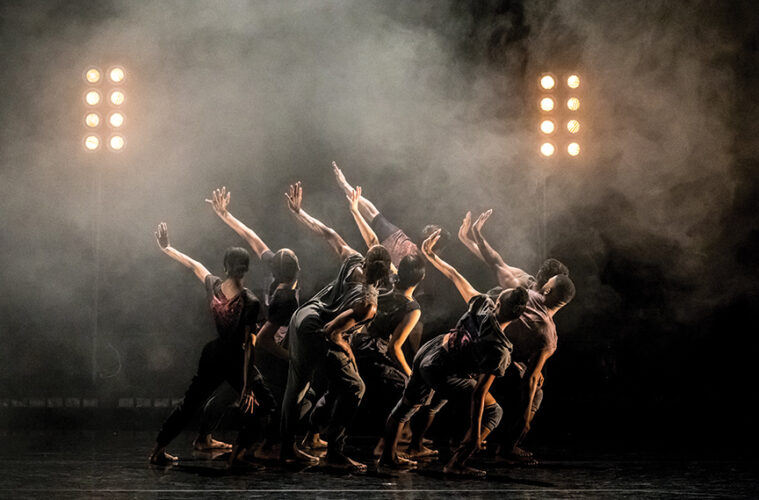BY SHALEEN DESTEFANO
We’ve always been drawn to The Newman Center for not only their vibrant performances, but for their dedication and commitment to ensuring that art is accessible to a wide audience by doing the work and taking the time to get to know the people of their community. We had the absolute pleasure of sitting down with their Executive Director, Aisha Ahmad-Post.
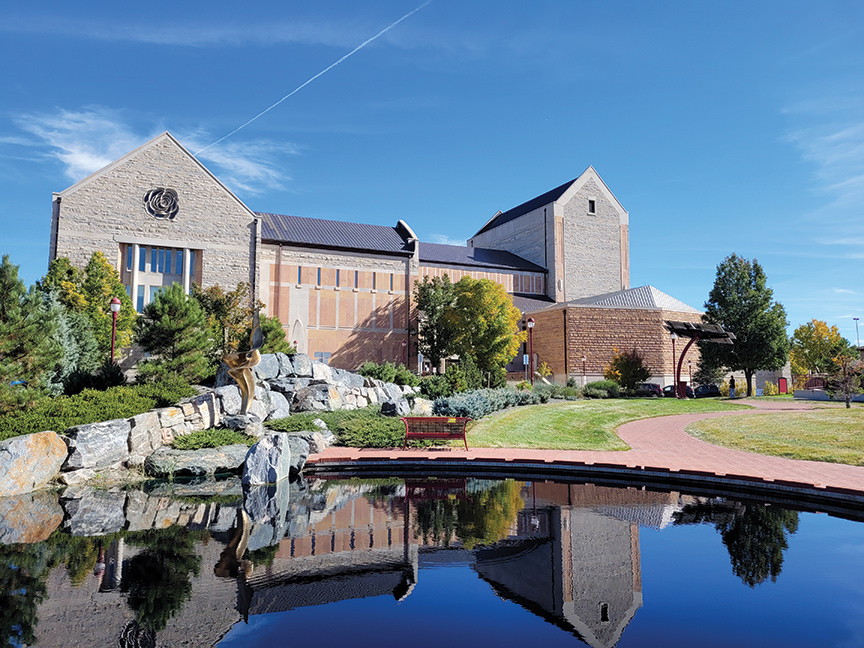 The Newman Center at DU is acclaimed as one of the Nation’s finest performing art centers while providing a genuine and grand effort to connect the community to the arts. Can you expand on this for our audience?
The Newman Center at DU is acclaimed as one of the Nation’s finest performing art centers while providing a genuine and grand effort to connect the community to the arts. Can you expand on this for our audience?
The Robert and Judi Newman Center for the Performing Arts has been around since 2002. It is our 20th anniversary season. We have presented hundreds of shows over the years going back to the start of the Center. It was built with the entire Denver art’s ecosystem in mind. While there was the Denver Center for the Performing Arts, there was a clear need for a high quality thousand seat venue that could host smaller events, and start bringing international and nationally-renowned touring acts to the Denver Metro Area. That has been the thrust of the Newman Center Presents Series since its inception. One of the things that I think about when I’m programming as the Artistic Director for the series, is how can I find ways to connect the hyper-locals and the International. What can I do through my work to support the communities that live here in Denver? Much of it is to think about who’s been featured on our stage, or who has been either implicitly or explicitly uninvited, and why? How do we highlight those that have been underserved and minoritized? I think a lot about the University of Denver’s mission to be a private university for the public good. So through that, we have a very strong community engagement and educational engagement program. Our education program serves K-12 students primarily in Denver Public Schools. We recently restructured that program in the wake of the pandemic after hearing overwhelmingly from arts educators in DPS, that due to layoffs, students were no longer getting access to the arts.
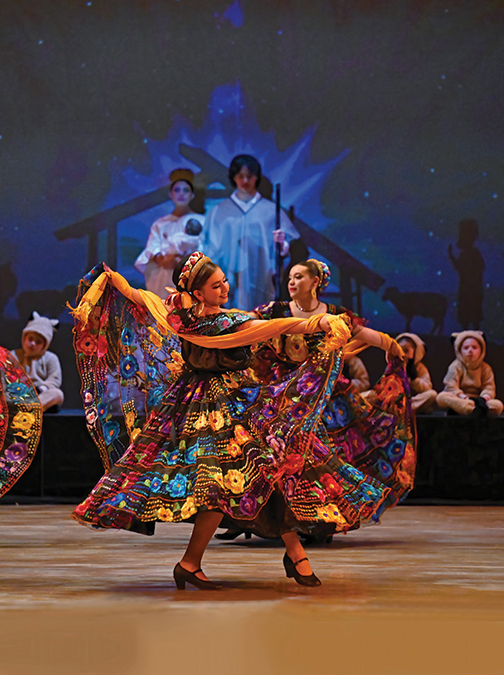 We started working on arts integration opportunities which means working with classroom teachers who may be teaching science, social studies or history and finding ways to build curriculum that meets their needs while also connecting it to the arts. As an example, teaching the history of the civil rights movements through freedom songs. It’s teaching about indigenous communities through social dances and song. There are so many ways that the arts are part of the fabric of a society and what we need our students to learn in order to be active participitory citizens. We work really closely with the teachers and then prepare them to come to the performances that we put on for the students. Then, through the community, we work closely with dozens of partners all over the city, whether it’s with media, or other arts organizations, sometimes nonprofits, to provide opportunities to folks to come and see a show that they might not otherwise see. We have really become a home for the arts and I would be remiss if I didn’t call out our rentals. We have become the home for many, many beloved Denver area arts organizations such as Friends of Chamber Music, Sound of the Rockies, Denver Brass and more. We do hundreds of shows each year and we’re very proud of our centerpiece in the Denver performing arts ecosystem.
We started working on arts integration opportunities which means working with classroom teachers who may be teaching science, social studies or history and finding ways to build curriculum that meets their needs while also connecting it to the arts. As an example, teaching the history of the civil rights movements through freedom songs. It’s teaching about indigenous communities through social dances and song. There are so many ways that the arts are part of the fabric of a society and what we need our students to learn in order to be active participitory citizens. We work really closely with the teachers and then prepare them to come to the performances that we put on for the students. Then, through the community, we work closely with dozens of partners all over the city, whether it’s with media, or other arts organizations, sometimes nonprofits, to provide opportunities to folks to come and see a show that they might not otherwise see. We have really become a home for the arts and I would be remiss if I didn’t call out our rentals. We have become the home for many, many beloved Denver area arts organizations such as Friends of Chamber Music, Sound of the Rockies, Denver Brass and more. We do hundreds of shows each year and we’re very proud of our centerpiece in the Denver performing arts ecosystem.
Pre-pandemic we had almost 200K visitors each year. One of the things I think about a lot is how to further increase that engagement. There are so many people moving to the Denver area from cities where a high level of arts and culture access is expected. I think we have a lot of work to do at DU in becoming more visible and accessible to the community and to first-time visitors.
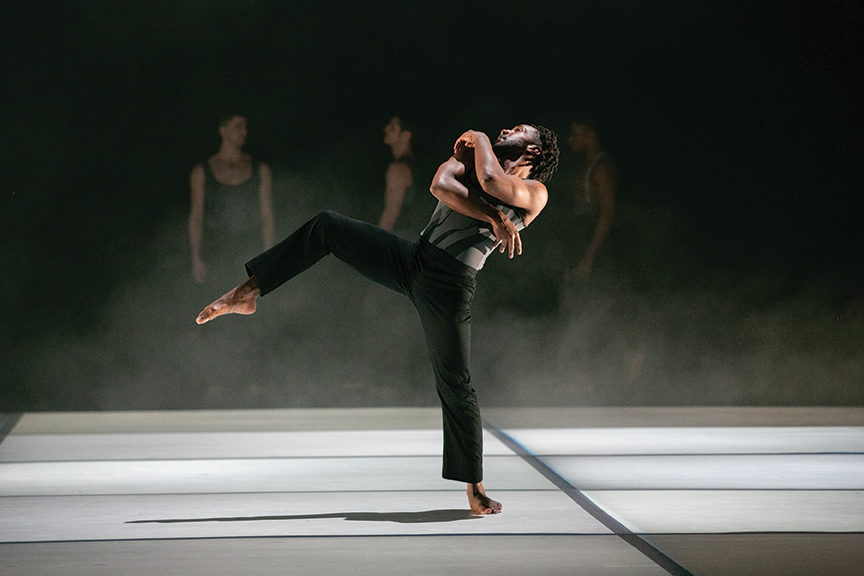 We love that you deliberately seek out diverse and thought-provoking performances. Can you offer us a glimpse into what we can expect for the upcoming season?
We love that you deliberately seek out diverse and thought-provoking performances. Can you offer us a glimpse into what we can expect for the upcoming season?
This 20th anniversary season highlights some folks that I’m really excited about as well as some that have been part of the Newman Center mix in the past who we want to celebrate. We are thrilled to welcome Damien Sneed this season! He is a gospel musician, a pianist and singer who served as Aretha Franklin’s music director through the end of her life. I saw him in NY just before the pandemic and he is just electric. He is brilliant at leading an audience through song. That will be a holiday performance on December 1st and we’re sure everyone will fall in love with him as I did. We also have Kyle Abraham and his full-length narrative work called “An Untitled Love” on January 27. Kyle Abraham is a modern dance choreographer who has worked with all of the major companies at this point and can be difficult to get as he is in high demand. This piece is all set to the music of D’Angelo, as Kyle reflects on his own experience in college, falling in and out of love, and the self-identity crisis that present themselves at that age. It is a relatable and beautiful piece and a great example of telling stories that wouldn’t normally be on the concert stage. On May 19 we have Cyrille Aimée, a French jazz vocalist who uses a lot of audio looping with elements of pop. We will be welcoming back Sam Bush, the bluegrass legend January 30, as well as Lila Downs October 28, the Mexican pop superstar and Latin Grammy winner who is highly connected to her Indigenous and Mexican heritage. These are a few examples of how we are trying to consider our audience, whose stories we will tell, what communities will we serve?
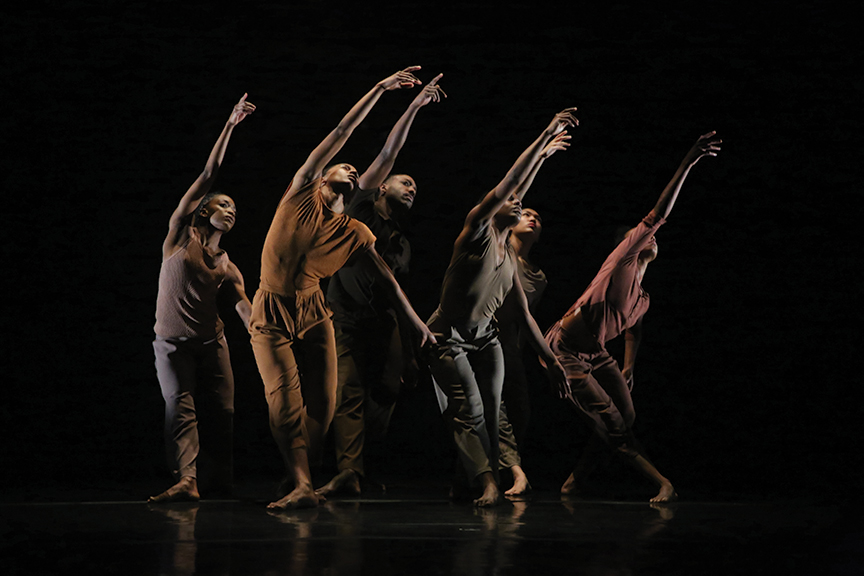 The Newman Center serves an impressive 6,300 students each year through free classes. How can our families support this philanthropic work for the long run?
The Newman Center serves an impressive 6,300 students each year through free classes. How can our families support this philanthropic work for the long run?
Absolutely! The Newman Center would not survive without our beloved volunteers, who give us thousands of hours of their time each year. For those interested in learning about volunteer opportunities, please reach out to Rachel Hargroder, our Assistant Director of Patron Services at Rachel.Hargroder@du.edu or 303.871.7929. We have an education opportunity fund as well. We are actively looking for donations to help with things like buses, free tickets, hiring artists to go into classes to meet with students prior to seeing a matinee, professional development for teachers, etc. Adriel Long is our Assistant Director of Development & Individual Giving at Adriel.Long@du.edu or 303.871.6426. Any financial support of our educational fund goes straight back into supporting art in the Denver metro area.
Aisha, can you give us the back story of how you found yourself in the important role of Executive Director? Were you always involved in the arts?
I begged my parents for piano lessons when I was very young and started playing at the age of two. I play classical and jazz bass, and attended The Jacob’s School of Music at Indiana University, one of the largest music schools in the country. Six years later I had a degree in piano and a master’s in music theory and quickly realized that I didn’t want to be an academic. I moved to New York City and got a job in the agency world, working for a for profit company that tours, manages and books in the classical music world of opera, orchestra and dance. This was followed by time at a smaller boutique booking agency and the New York Public library as the Producer for public programs for the main branch. So, instead of doing just performing arts, I was looking at a broader lens of specifically narrative fiction and poetry, but also government officials, celebrities, thought-leaders etc. I developed that program over five years, got married and decided I didn’t want to live in NY forever. We ended up moving to Colorado Springs where I helped to open the Ent Center for the Arts at the University of Colorado in Colorado Springs, and I was the inaugural director for three years. Then, my predecessor here at DU left for a very big position and I applied, and what do you know, I got the job! I started during the pandemic in August of 2020. It’s been a roller coaster ride the last two years, but I feel like I have the best job in the world.
How do you see the Newman Center evolving in the next year?
I see us really leaning into the connection between artistic impact, university impact and community impact, really thinking about building more artistic vibrancy. I’m using that very specifically instead of “excellence” because I think there’s something to be said about making sure that what you’re bringing is really resonating with your community. I keep coming back to this notion of an arts ecosystem. What we bring to the Newman Center has ramification for other conversations that happen in the community. To the contrary, what happens elsewhere in the community directly impacts what happens at the Newman Center. I really want to lean into that, finding more nodes of interdisciplinary inquiry, such as the program we’re starting to build with the Korbel School of International Studies here at DU around cultural diplomacy. I want to build more opportunities to bring artists into the community outside of the Newman Center. Whether that’s by doing outreach concerts, or free concerts elsewhere for example. In addition, we want to really think about opportunities to serve the artistic creation process through commissioning, creative residencies, exchanging of ideas, international work, etc. I’m really hoping this is how we lead into the future. I think an art center is only as good as its commitment to the environment around it. I want to make art not only accessible to a wide audience, but offer the invitation and reminder that, yes, this is for you. You don’t have to have a degree in music history to appreciate this. There is something to be gained that enriches all of our lives.
We hope to see you at many of the brilliant performances on deck for this upcoming season. Visit newmancenterpresents.com for more details.

